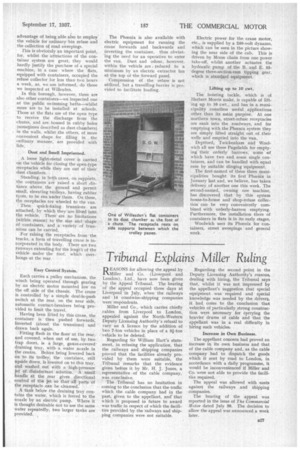Tribunal Explains Miller Ruling
Page 37

If you've noticed an error in this article please click here to report it so we can fix it.
REASONS for allowing the appeal by Miller and Co. (Liverpool and London), Ltd., have now been given by the Appeal Tribunal. The hearing of the appeal occupied 'three days at Liverpool in July, when the railways and 14 coastwise-shipping companies were respondents.
Miller and Co., which carries chiefly cables from Liverpool to London, appealed against the North-Western Deputy Licensing Authority's refusal to vary an A licence by the addition of two 7-ton vehicles in place of a Si-ton vehicle to be deleted.
Regarding Sir William Hart's statement, in refusing the application, that the railways and shipping companies proved that the facilities already provided by them were suitable, the Tribunal remarks that the evidence given before it by Mr. H. J. Jones, a representative of the cable company, was conclusive.
The Tribunal has no hesitation in coming to the conclusion that the traffic which the cable company had in the past, given to the appellant, and that which it proposed in future to award was traffic in respect of which the facilities provided by the railways and shipping companies were not suitable. Regarding the second point in the Deputy Licensing Authority's reasons, dealing with hiring, the Tribunal says that, whilst it was not impressed by the appellant's suggestion that special equipment was required and special knowledge was needed by the drivers, it had come to the conclusion that vehicles of particularly strong construction were necessary for carrying the heavier drums of cable and that the appellant was in a real difficulty in hiring such vehicles.
Increase in Own Business.
The appellant concern had proved an increase in its own business and that of the cable company and, as the cable company had to dispatch the goods which it sent by road to London, in accordance with a daily programme, it would be inconvenienced if Miller and Co. were not able to provide the facilities required.
The appeal was allowed with costs against the railways and shipping companies.
The hearing of the appeal was reported in the issue of The Commercial Motor dated July SO. The decision to allow the appeal was announced a week later.




















































































